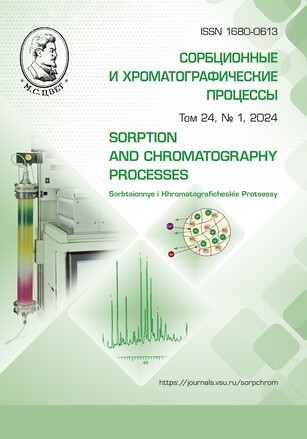Determination of non-combustible impurities in detonation nanodiamond powder
Abstract
The study of the physicochemical (including adsorption) properties of nanodiamond requires the possibility of reproducible generation of the carbon surface of an individual particle without metal impurities of unknown composition. This kind of surface can be obtained through an additional deep cleaning of a commercially available sample. This article is dedicated to the study of the composition of non-combustible impurities of detonation nanodiamond powder. Using inductively coupled plasma mass spectrometry, iron and titanium were identified as the main metal components of the unburned residue, and the presence of Cr, Ni, Zr, As, and Sb was qualitatively established. The expected composition of the main molecular ions formed on the surface of the unburned residue in the course of laser desorption/ionisation mass spectrometry was presented. Based on the results of mass spectrometry analysis, a method of two-stage chemical treatment of detonation nanodiamond powder was proposed, which allowed reducing the mass fraction of non-combustible impurities during annealing in air from 2.0 to 0.1%.
Downloads
References
Dolmatov V.Ju. Ul'tradispersnye almazy detonacionnogo sinteza: svojstva i primenenie. Uspehi himii. 2001; 70(7): 687-708. (In Russ.)
Toropov A.D., Detkov P.Ja., Chuhaeva S.I. Poluchenie i svojstva kompozicionnyh nikelevyh pokrytij s ul'tradisper-snymi almazami. Gal'vanotehnika i obrabotka poverhnosti. 1999; 7(3): 14-19. (In Russ.)
Dolmatov V.Ju., Burkat G.K. Ul'tradispersnye almazy detonacionnogo sinteza kak osnova novogo klassa kompozicionnyh metall-almaznyh gal'vanicheskih pokrytij. Sverhtverdye materialy. 2000;1: 84-95. (In Russ.)
Spitsyn B.V., Davidson J.L., Gradoboev M.N., Galushko T.B., Serebry-akova N.V., Karpukhina T.A., Kulakova I.I., Melnik N.N. Inroad to modification of detonation nanodiamond. Diam. Relat. Ma-ter. 2006; 15: 296-299. https://doi.org/10.1016/j.diamond.2005.07.033
Kulakova I.I. Khimija poverhnosti nanoalmazov. Fizika tverdogo tela. 2004; 46(4): 621-628. (In Russ.)
Gorbachev V.A., Shevchenko N.V., Mironov S.I. Nanoalmaznye komponenty jenergoemkih kondensirovannyh sistem. M., Granica, 2022, 296 p. (In Russ.)
Dolmatov V.Yu. Patent RF, № 2348580, 2009. (In Russ.)
Dolmatov V.Yu. Detonacionnye nanoalmazy. Poluchenie, svojstva, prime-nenie. Sankt-Peterburg, Professional, 2011, 536 p. (In Russ.)
Yarykin D.I., Konyukhov V.Yu., Gegova R.S., Spitsyn B.V. Investigation of the Adsorption Properties of a Nanodiamond Surface after Liquid-Phase Oxidation. Pro-tection of Metals and Physical Chemistry of Surfaces. 2022; 58(6): 1206-1211. https://doi.org/10.1134/S2070205122060211
Ovcharenko A.G., Ignatchenko A.V., Sataev P.P., Brylyakov P.M. Patent RF, № 1815933, 1990. (In Russ.)
Gordeev S.K., Korchagina S.B., ZHukova N.A., Dolmatov V.YU. Patent RF, № 2244679, 2002. (In Russ.)
Novikov N.V., Bogatyreva G.P., Vo-loshin M.N. Tekhnologiya polucheniya i ochistki detonacionnyh nanoalmazov. Det-onacionnye almazy v Ukraine. Fizika tverdogo tela. 2004; 46(4): 585-590. (In Russ.)
Denisov S.A., Spitsyn B.V. Gazofaznyj metod ochistki produktov detonacionnogo sinteza nanoalmaza ot nealmaznyh form ugleroda i neuglerodnyh primesej. Uspekhi v himii i himicheskoj tekhnologii. 2009; 23(9): 71-76. (In Russ.)
Solovyeva K.N., Petrov E.A., Belayev V.N. Research of properties of detonation nanodiamond depending on deep cleaning technology. South-Siberian Scientific Bulletin. 2020; 3(31): 62-67.
Karnaeva A., Kulikova O., Mazlova E., Buryak A. Aged diesel and heavy metal pollution in the Arctic tundra (Yamal Pen-insula, Russia). Science of total environ-ment. 2021; 792:148471. https://doi.org/10.1016/j.scitotenv.2021.148471
Khesina Z.B., Karnaeva A.E., Pytskii I.S., Buryak A.K. The mysterious mass death of marine organisms on the Kam-chatka Peninsula: A consequence of a technogenic impact on the environment or a natural phenomenon? Marine Pollution Bulletin. 2021; 166: 112175. https://doi.org/10.1016/j.marpolbul.2021.112175
Kuznecova E.S., Pyckij I.S., Burjak A.K. Obnaruzhenie i kolichestvennoe opredelenie adsorbirovannogo hlora na poverhnostjah konstrukcionnyh materialov. Sorbtsionnye i khromatograficheskie protsessy. 2020; 20(5): 602-607. https://doi.org/10.17308/sorpchrom.2020.20/3051 (In Russ.)
Sholokhova A.Yu, Malkin A.I., Buryak A.K. Mass Spectrometric Study of Products of Teflon Degradation via Sur-face-Activated Laser Desorp-tion/Ionization. Russian Journal of Physi-cal Chemistry A. 2020; 94(10): 2135-2140. https://doi.org/10.1134/s003602442010026x
Charykov N.A., Alekseev N.I., Ara-pov O.V., Alekhin O.S., Gerasimov V.I., Nekrasov K.V., Polekhovskii Yu.S., Se-menov K.N. Modification of natural shungites to obtain a mixed nanocarbon material (MNS). Russ. J. Appl. Chem. 2005; 78(6); 865-869. https://doi.org/10.1007/s11167-005-0411-z







